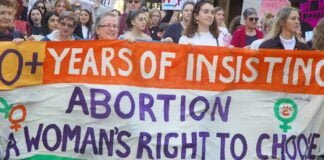A federal government review into workplace culture in federal parliament has found that an astonishing one in three staffers there have experienced sexual harassment.
The report, written by Sex Discrimination Commissioner Kate Jenkins, was commissioned in March following public outrage at the attempt by the government to cover up the alleged rape of former Liberal staffer Brittany Higgins inside parliament house in 2019.
Just days before Morrison commissioned the Jenkins inquiry, the then Liberal Defence Minister Linda Reynolds called Brittany Higgins a “lying cow”.
Since Brittany Higgins’ accusations, the Liberals have been rocked by a series of sexual abuse scandals revealing their contempt for women. Most recently, Federal Education Minister Alan Tudge was forced to stand aside after former staffer, Rachelle Miller, alleged her 2017 affair with Tudge was “at times abusive”.
The report also found that 51 per cent of workers in federal parliamentary offices have experienced at least one incident of bullying, sexual harassment, or actual or attempted sexual assault, with the harassment and bullying disproportionately reported by female staff and MPs.
“From the get-go there’s no incentive to actually report because it’s not going to change it and it’s probably actually going to make it worse,” one staffer told the inquiry.
The report concluded that the harassment and assault were “largely driven by power imbalances, gender inequality and exclusion and a lack of accountability”.
The report also made 28 recommendations including implementing gender and diversity targets, rules around alcohol consumption, codes of conduct, reviewing rules of the parliamentary chambers and improving support services.
Disturbing
Prime Minister Scott Morrison called the findings of the Jenkins report “appalling” and “disturbing”, and said “the recommendations cover all the right territory”.
But Morrison has not committed to any action, just as the government did nothing about the 55 recommendations of the Respect@Work that Jenkins delivered in March 2020.
Women should feel safe at work, but addressing the “boys’ club” in parliament will do little to fix the sexism embedded in the system that parliament is responsible for.
While the Liberal Party has signed off on a 10-year plan to increase the number of Liberal women in parliament, this will do nothing to improve the lives of ordinary women.
It was Liberal women Linda Reynolds and Michaela Cash who covered up Higgins’ alleged rape. And in July this year, the Liberal National Party’s Women’s Conference voted to support George Christensen’s anti-abortion bill and to oppose gender quotas claiming they would “basically punish men”.
In the last nine years in federal government, the Liberals have overseen some of the worst attacks on women. They have forced women on JobSeeker to live in poverty, introduced the punitive ParentsNext program, left domestic violence and other women’s services chronically underfunded and worked with Pauline Hanson to abolish the specialist Family Court, to name just a few.
Poverty
The government’s economic response to the pandemic shows that if they truly cared about fighting women’s oppression, they could find the money to fund the services that could radically transform women’s lives.
It is women who have borne the brunt of the pandemic; a Grattan Institute report found that women were more likely to lose their job, did even more unpaid work and were less likely to get government support.
But while the government found $130 billion to fund the JobKeeper payment, only 13 per cent of single mothers received the wage subsidy. And while the government briefly doubled the JobSeeker payment, 700,000 unemployed women are now again living below the poverty line.
Workplace sexual harassment is horrifyingly widespread, with a 2018 report by the Australian Human Rights Commission finding that 85 per cent of women over the age of 15 have experienced sexual harassment in the workplace.
To fight for a world in which women are safe at work, we need to fight the structures that leave women vulnerable to violence, abuse and harassment. We need to fight the gender pay gap, for abortion rights, for funding for women’s services, for higher welfare payments, for free childcare and against casualisation.
These are the things that can empower women and give them greater security and confidence to speak up about harassment, and provide the financial independence and support needed to leave abusive relationships.
Parliament House should be a safe workplace. But the harassment that women suffer inside Parliament reflects the oppression and discrimination that it inflicts on women in wider society. It will be struggle outside parliament that can bring real change.
By Ruby Wawn






